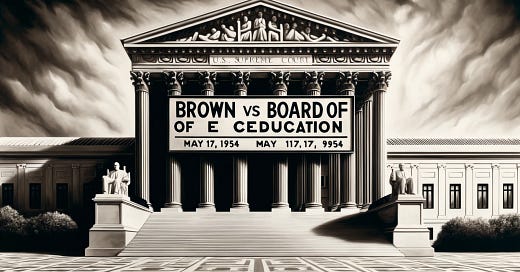70 Years On: US Supreme Court's Historic Ruling Against Segregated Schools
Prelude to the Brown v. Board of Education Judgment
The Brown v. Board of Education ruling, issued by the U.S. Supreme Court on May 17, 1954, marked a pivotal moment in the history of the civil rights movement in the United States. This landmark decision—observing its 70th anniversary this week—declared that state laws establishing racial segregation in public schools were unconstitutional, even if the segregated schools were otherwise equal in quality. This verdict overturned the long-standing "separate but equal" doctrine established by the 1896 Plessy v. Ferguson case, which had legitimised racial segregation for decades.
Key Points of the Brown v. Board of Education Decision
Unanimous Decision
The Supreme Court, led by Chief Justice Earl Warren, delivered a unanimous 9-0 decision in favour of the plaintiffs, declaring that segregated public education was inherently unequal and violated the Equal Protection Clause of the Fourteenth Amendment.
Psychological Impact
The Court cited psychological studies, including those by Kenneth and Mamie Clark, which demonstrated that segregation had a detrimental effect on black children's self-esteem and learning capabilities.
Historical Context
The decision acknowledged that the history of the Fourteenth Amendment was inconclusive regarding its intended effect on public education. However, it accentuated the importance of considering the full development and current role of public education in American life.
Supreme Court Ruling and Its Aftermath in the Civil Rights Movement
The Brown v. Board of Education ruling, delivered on May 17, 1954, was a cornerstone in the broader civil rights movement. This landmark Supreme Court decision dismantled the legal basis for racial segregation in public schools, setting a vital precedent for challenging segregation in other areas of American life. However, the ruling was merely the beginning, as racial discrimination was deeply rooted in American society, persisting despite constitutional provisions.
In the years that followed, Martin Luther King Jr. emerged as a prominent leader, building upon the momentum generated by this ruling. His leadership and philosophy of nonviolent resistance galvanized the movement, highlighting the enduring injustice of segregation and discrimination. King's famous "I Have a Dream" address, delivered on August 28, 1963, during the March on Washington for Jobs and Freedom, underscored the ongoing struggle for equality. Tragically, his assassination on April 4, 1968, in Memphis, Tennessee, further illustrated the entrenched resistance to racial equality.
The Brown decision provided judicial validation for the civil rights movement's demands, reinforcing the moral and legal imperative to dismantle systemic racism. Yet, it was the subsequent activism and sacrifices of leaders like Martin Luther King Jr. that paved the way for more comprehensive changes, underscoring that the fight for civil rights extended far beyond the courtroom.
Reflections from the Obamas on the 60th Anniversary of Brown v. Board of Education
Presidential Proclamation by Barack Obama
On the 60th anniversary of Brown v. Board of Education, the then President Barack Obama had issued a Presidential Proclamation and delivered remarks highlighting the significance of the ruling and its profound impact on American society. In his proclamation, Obama underscored that the decision marked a turning point in America's journey toward equality by overturning the "separate but equal" doctrine established by Plessy v. Ferguson. He acknowledged the ongoing struggle for civil rights and the need to continue striving for equal opportunities for all children. Obama called upon Americans to observe the anniversary with programs, ceremonies, and activities celebrating the landmark decision and advancing the causes of equality and opportunity for all. He quoted Justice Thurgood Marshall, who argued the case against segregation, to underscore the collective effort required to achieve progress: "None of us got where we are solely by pulling ourselves up by our bootstraps. We got here because somebody...bent down and helped us pick up our boots."
Remarks by Michelle Obama
First Lady Michelle Obama had also contributed to the commemoration by delivering remarks at the Topeka School District Senior Recognition Day. She celebrated the graduates as the living legacy of the Brown decision, highlighting the diversity and unity of the students. Michelle Obama reflected on the progress made since the ruling and emphasised the importance of continuing to work towards a more inclusive and equitable society. Her remarks served as a poignant reminder of the enduring relevance of the Brown v. Board of Education decision and the ongoing effort to achieve true equality in education.
Observing the 70th Anniversary
Events and Celebrations
The 70th anniversary of this landmark ruling is being commemorated in 2024 with a series of events organised by the NAACP in collaboration with the National Museum of African American History and Culture. These events feature notable historical figures, educators, and advocates, including members of the Little Rock Nine and Brown litigants.
Ongoing Challenges
Despite the historic ruling, public schools in the U.S. remain deeply segregated. Recent data indicates that a significant percentage of Black and Hispanic students attend schools where the majority of students are of colour, often in high-poverty areas. This ongoing segregation highlights the persistent inequalities in the education system.
Legal and Political Climate
The anniversary comes at a time of renewed challenges to racial equality in education, including recent Supreme Court decisions affecting race-conscious college admissions and political actions restricting the teaching of racism in U.S. history.
Impact on Politics
The Brown v. Board of Education decision not only transformed public education but also served as a catalyst for the broader civil rights movement. It underscored the role of the judiciary in addressing social injustices and set a precedent for future rulings on civil rights issues. The decision also galvanised political efforts to further dismantle systemic racism and promote equality across various sectors of American society.
Controversies Surrounding DEI Initiatives
In recent years, diversity, equity, and inclusion (DEI) initiatives in the U.S. have sparked debates and controversies. Critics argue that these initiatives, while well-intentioned, may have been taken too far, potentially undermining merit and genuine equality. Some contend that certain DEI policies can lead to reverse discrimination and create new forms of inequity. The balance between fostering diversity and maintaining meritocracy remains a contentious issue, reflecting the complex dynamics of achieving true equality.
The Indian Context: Reservation Policies
In India, even into the 75th year of the republic, policymakers and courts continue to grapple with the complexities of reservation policies. These policies, aimed at uplifting historically marginalised communities, have led to intense debates and legal battles. Reserved classes vie for a larger share of opportunities, often at the expense of the 'general category' candidates. This tug-of-war underscores the ongoing struggle to balance social justice with meritocracy, and the challenges in creating an equitable society.
A Unified Human Ethos: Sikhism's Perspective
Reflecting on these issues from a Sikh perspective, the ethos of Sikhism emphasises the unity and equality of all humanity. The teachings of Guru Nanak Dev Ji and the other Sikh Gurus advocate for the intrinsic worth and dignity of every individual, transcending caste, race, and social status. As we commemorate the 70th anniversary of the Brown v. Board of Education decision and reflect on India's reservation policies, it is essential to draw inspiration from these universal values. The journey toward true equality and justice requires a collective commitment to recognising and respecting the inherent humanity in each person.
Summing Up
The 70th anniversary of the Brown v. Board of Education ruling serves as a poignant reminder of the progress made and the challenges that remain in achieving educational and social equality. As we honour this landmark decision, we must continue to strive for a society where every individual, regardless of race or background, has equal opportunities to succeed. Drawing from the Sikh ethos of unity and equality, let us work towards a future where justice and equity are not just aspirations but lived realities.





